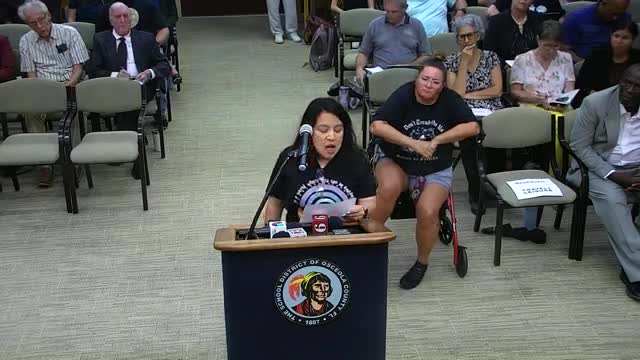School Chaplain Policy Sparks Fierce Debate Over Religious Freedom
August 28, 2024 | Osceola, School Districts, Florida
This article was created by AI summarizing key points discussed. AI makes mistakes, so for full details and context, please refer to the video of the full meeting. Please report any errors so we can fix them. Report an error »

In a recent school board meeting in Florida, heated discussions erupted over a proposed chaplain program aimed at providing spiritual guidance in schools. Opponents of the program voiced strong concerns about the potential infringement on students' rights to a secular education, arguing that the presence of chaplains could lead to coercion and unwanted religious influence in public schools.
Jason Carroll, a parent and community member, emphasized that the Constitution guarantees students the right to attend public schools free from religious pressure. He expressed fears that the program could compel children to engage in religious practices, undermining the religious freedom of families. Carroll highlighted the troubling history of sexual abuse by clergy, stating that he would be uncomfortable placing his child in a situation involving a chaplain.
Another speaker, Jason Hurl, echoed these sentiments, advocating for increased funding for trained mental health professionals instead of religious figures. He criticized the program as discriminatory and unconstitutional, arguing that it could lead to costly legal challenges for the district. Hurl pointed out that the First Amendment protects not only the freedom of religion but also the freedom from religion, urging the board to reconsider the implications of the proposed policy.
Conversely, supporters of the chaplain program, including Diana Graniella, argued that it provides essential emotional and spiritual support to students in need. Graniella claimed that chaplains offer a compassionate presence during difficult times and that the program is voluntary, requiring parental consent. She emphasized the importance of allowing families to choose spiritual guidance if they desire it, framing the initiative as a reflection of the community's diverse beliefs.
The meeting highlighted a significant divide within the community regarding the role of religion in public education. As the board considers the chaplain program, the discussions underscore broader questions about religious freedom, the separation of church and state, and the best ways to support students' mental health and well-being.
Jason Carroll, a parent and community member, emphasized that the Constitution guarantees students the right to attend public schools free from religious pressure. He expressed fears that the program could compel children to engage in religious practices, undermining the religious freedom of families. Carroll highlighted the troubling history of sexual abuse by clergy, stating that he would be uncomfortable placing his child in a situation involving a chaplain.
Another speaker, Jason Hurl, echoed these sentiments, advocating for increased funding for trained mental health professionals instead of religious figures. He criticized the program as discriminatory and unconstitutional, arguing that it could lead to costly legal challenges for the district. Hurl pointed out that the First Amendment protects not only the freedom of religion but also the freedom from religion, urging the board to reconsider the implications of the proposed policy.
Conversely, supporters of the chaplain program, including Diana Graniella, argued that it provides essential emotional and spiritual support to students in need. Graniella claimed that chaplains offer a compassionate presence during difficult times and that the program is voluntary, requiring parental consent. She emphasized the importance of allowing families to choose spiritual guidance if they desire it, framing the initiative as a reflection of the community's diverse beliefs.
The meeting highlighted a significant divide within the community regarding the role of religion in public education. As the board considers the chaplain program, the discussions underscore broader questions about religious freedom, the separation of church and state, and the best ways to support students' mental health and well-being.
View full meeting
This article is based on a recent meeting—watch the full video and explore the complete transcript for deeper insights into the discussion.
View full meeting